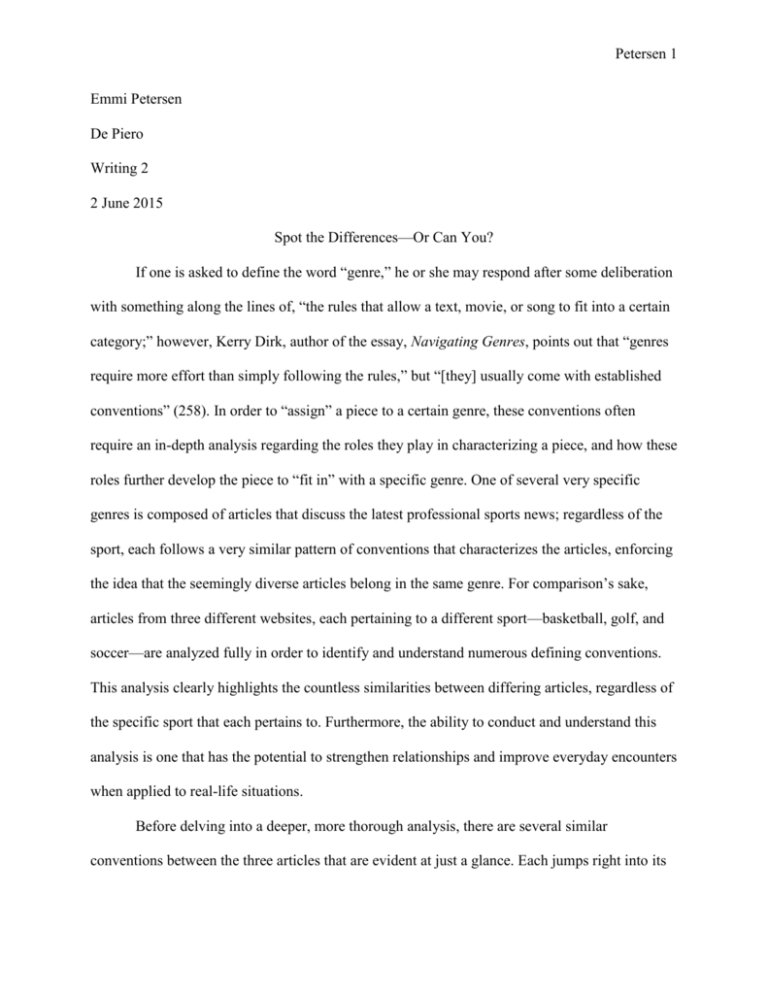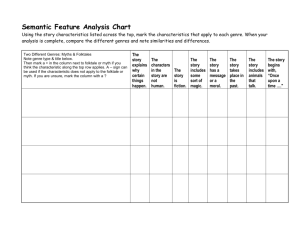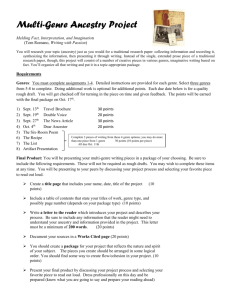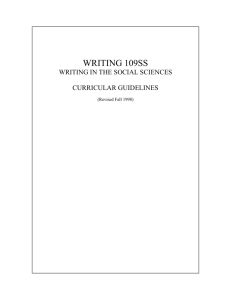File
advertisement

Petersen 1 Emmi Petersen De Piero Writing 2 2 June 2015 Spot the Differences—Or Can You? If one is asked to define the word “genre,” he or she may respond after some deliberation with something along the lines of, “the rules that allow a text, movie, or song to fit into a certain category;” however, Kerry Dirk, author of the essay, Navigating Genres, points out that “genres require more effort than simply following the rules,” but “[they] usually come with established conventions” (258). In order to “assign” a piece to a certain genre, these conventions often require an in-depth analysis regarding the roles they play in characterizing a piece, and how these roles further develop the piece to “fit in” with a specific genre. One of several very specific genres is composed of articles that discuss the latest professional sports news; regardless of the sport, each follows a very similar pattern of conventions that characterizes the articles, enforcing the idea that the seemingly diverse articles belong in the same genre. For comparison’s sake, articles from three different websites, each pertaining to a different sport—basketball, golf, and soccer—are analyzed fully in order to identify and understand numerous defining conventions. This analysis clearly highlights the countless similarities between differing articles, regardless of the specific sport that each pertains to. Furthermore, the ability to conduct and understand this analysis is one that has the potential to strengthen relationships and improve everyday encounters when applied to real-life situations. Before delving into a deeper, more thorough analysis, there are several similar conventions between the three articles that are evident at just a glance. Each jumps right into its Petersen 2 core topic with a big, bold, black title that informs the reader quite explicitly what the following article will be about. For example, “History, Momentum Likely on Curry's Side in MVP Chase,” allows little room for questioning what the article is going to discuss—most likely why Stephen Curry is expected to win an MVP award. Each of these bold titles is followed (in one case, preceded) immediately by the author’s name and the date and time the article was published. Below that is either a photograph or a short clip exemplifying (once again) exactly what the article focuses on. One last observable convention is the format in which the articles are written: paragraphs are broken up with a small gap between each and tend to consist of only one or two sentences, many of which are in quotation marks. Upon conducting a more exhaustive analysis, there are clear repetitions of patterns found not only in articles regarding the same sport, but in ones that discuss Premier League soccer, the Masters Golf tournament, and the NBA. First and foremost, the purpose of each article is to inform followers of the sport about recent, noteworthy news and possible upcoming events pertaining to the particular sport. The intended audiences are most often dedicated followers, rather than people with little background in the matter. A person who does not keep up with the sport is highly unlikely to know Phil Mickelson by his nickname, “Lefty,” or the Manchester City soccer club by their title, the “defending Premier League Champions” (Coffin, Macintosh). Each report is clearly tailored to appeal to a very specific audience. While the jargon used in the differing articles is unique in regards to the matter it refers to, it is simultaneously quite similar in that each sport has its own set of words that relates to it and is perhaps only understood by someone who possesses an understanding of that sport. For example, “birdies” and “green jacket” apply to specifically to golf, whereas “a pair of quick corners” pertains specifically to soccer (Coffin, Smith). Each of the authors writes factually, yet Petersen 3 rather casually—after listing some (dazzling) facts about Curry, Smith comments, “Oh, and he added 10 assists for good measure” —and incorporates a bit of his own flair and perhaps (as demonstrated earlier in this very sentence) even some admiration. While comparing Steph Curry’s current NBA season to that of another candidate, Sekou’s opinion infiltrates a generally fact-based article with the statement, “Curry’s is just as good, if not better.” After all, how could an NBA news reporter not respect the unmatched talent of Steph Curry? Similarly, after Macintosh mentions that Manchester United fought their way to victory after losing to the same team for two and a half years, he slips in that their “fires are burning again, the attitude is flaring up,” demonstrating another instance of opinionated admiration. These authors convey their tones in the simple nature of writing what they do; they write about sports because they are excited about those sports, and they want to inform followers about important events, new records, and “plays of the day.” Their tones are portrayed in the descriptive accounts of occurrences that they felt were worth writing about. The similarities continue to grow as each article offers statistics regarding the prominent subject; for instance, “Manchester United and Manchester City are Going in Opposite Directions” informs its audience of Manchester United’s loss-filled past (Macintosh), and “History, Momentum Likely on Curry's Side in MVP Chase” states that Stephen Curry “leads the league in both 3-pointers made (276) and attempted (625) and ranks third in the league in 3-point percentage (44.2 percent)” (Smith). Generally, in addition to the statistics, there are statements from coaches, mentors, teammates, and/or the “star” of the article quoted directly from interviews, usually discussing a recent or upcoming game or event. Phil Mickelson, the star of the golf article, himself, states prior to his upcoming tournament, “I think I’ll be able to put some good numbers up there” (Coffin). Petersen 4 After all of this digging and analysis, what is there to show for it? Laura B. Carroll, author of Backpacks vs. Briefcases: Steps Toward Rhetorical Analysis states, “the more we know about how to analyze situations and draw informed conclusions, the better we can become about making savvy judgments about the people, situations, and media we encounter” (61). It is true (and completely justifiable) that most people do not spend their free time thoroughly analyzing textual genres and their conventions, then later forming a career out of the practice, so why have I just presented the readers with paragraphs of that very thing? As Carroll implies, rhetorical and genre analysis are a small part of a much larger picture, one that is applicable to situations that people encounter on a daily basis. The ability to step back and analyze a situation and, in turn, make a decision based on a more thorough understanding, rather than one based on haste and instinct, gives a person the potential to build better relationships with others and avoid problematic circumstances. These concepts learned through the process of analyzing genre and rhetoric can be practiced in more meaningful situations than simply trying to earn an A on an essay; this essentially confirms the importance of rhetorical analysis for anyone who might find him or herself in any circumstances in which he or she much engage in the company of others. The word “genre” on its surface may bring about groans and whispers of “boring” and/or “easy,” but after diving below the top layer, it clearly necessitates a far more interesting and rigorous breakdown than simply classifying a novel as “romantic” or song as “country.” As proven above, an ambiguous list of conventions, from style and presentation to diction and meaning, formed patterns and continue to form patterns that, over time, give way to countless different genres. The ability to scrutinize and evaluate these genres is not only helpful in writing or analyzing a piece of writing, but also in everyday discussions, arguments, and even wordless actions. Petersen 5 Bibliography Carroll, Laura B. "Backpacks vs. Briefcases: Steps toward Rhetorical Analysis." 2015. Writing 2. Comp. Zachary De Piero. N.p.: n.p., 2015. N. pag. Print. Coffin, Jay. "No Doubt: Mickelson Upbeat after Friday 68." NBCSports.com. N.p., 10 Apr. 2015. Web. 12 Apr. 2015. Dirk, Kerry. "Navigating Genres." 2015. Comp. Zachary De Piero. Writing 2. N.p.: n.p., 2015. N. pag. Print. Macintosh, Iain. "Manchester United and Manchester City Are Going in Opposite Directions." ESPN.com. N.p., 12 Apr. 2015. Web. 12 Apr. 2015. Smith, Sekou. "History, Momentum Likely on Curry's Side in MVP Chase." NBA.com. N.p., 10 Apr. 2015. Web. 12 Apr. 2015.




